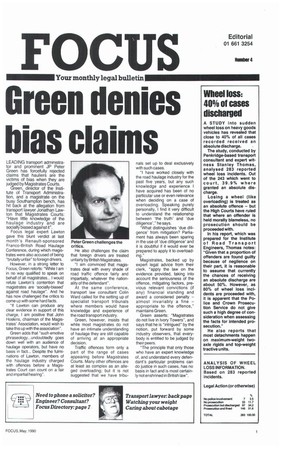Green denies bias claims
Page 3

If you've noticed an error in this article please click here to report it so we can fix it.
LEADING transport administrator and prominent JP Peter Green has forcefully rejected claims that hauliers are the victims of bias when they are judged by Magistrates Courts.
Green, director of the Institute of Transport Administration, and a magistrate on the busy Southampton bench, has hit back at the allegation from transport lawyer Jonathan Lawton that Magistrates Courts: "Have little knowledge of the haulage industry and are socially biased against it".
Focus legal expert Lawton gave this blunt verdict at last month's Renault-sponsored Franco-British Road Haulage Conference, during which magistrates were also accused of being "brutally unfair" to foreign drivers.
However, in a strong letter to Focus, Green retorts: "While I am in no way qualified to speak on behalf of all magistrates... I would refute Lawton's contention that magistrates are 'socially-biased' against road haulage". And he has now challenged the critics to come up with some hard facts.
"If Lawton can produce any clear evidence in support of this charge, I am positive that John Hoskins, chairman of the Magistrates' Association, would wish to take this up with the association".
Green adds that "such emotive phraseology.. undoubtedly goes down well with an audience of haulage operators, but have no basis in fact... Despite the fulminations of Lawton, members of the haulage industry charged with offences before a Magistrates Court can count on a fair and impartial hearing".
Peter Green challenges the critics.
He also challenges the claim that foreign drivers are treated unfairly by British Magistrates.
"I am convinced that magistrates deal with every shade of road traffic offence fairly and impartially, whatever the nationality of the defendant".
At the same conference, transport law consultant Colin Ward called for the setting up of specialist transport tribunals where members would have knowledge and experience of the road transport industry.
Green, however, insists that while most magistrates do not have an intimate understanding of haulage they are still capable oi arriving at an appropriate decision.
Traffic offences form only a part of the range of cases appearing before Magistrates Courts. Many other offences are at least as complex as an alleged overloading; but it is not suggested that we have tribu
nals set up to deal exclusively with such cases.
"I have worked closely with the road haulage industry for the past five years, but any such knowledge and experience I have acquired has been of no particular use or even relevance when deciding on a case of overloading. Speaking purely personally, I find it very difficult to understand the relationship between 'the truth' and 'due diligence'." he says.
"What distinguishes 'due diligence' from mitigation? Parliament has always been sparing in the use of 'due dilligence' and it is doubtful if it would ever be prepared to apply it to overloading."
Magistrates, backed up by expert legal advice from their clerk, "apply the law on the evidence provided, taking into account the seriousness of the offence, mitigating factors, previous relevant convictions (if any) financial standing and award a considered penalty — almost invariably a fine — appropriate to the offence," maintains Green.
Green asserts: "Magistrates do not live in Ivory Towers", and says that he is "intrigued" by the notion, put forward by some industry observers, that everybody is entitled to be judged by their peers.
"The principle that only those who have an expert knowledge of, and understand every defendant's particular problems can do justice in such cases, has no basis in fact and is most certainly not enshrined in British law".
























































































































